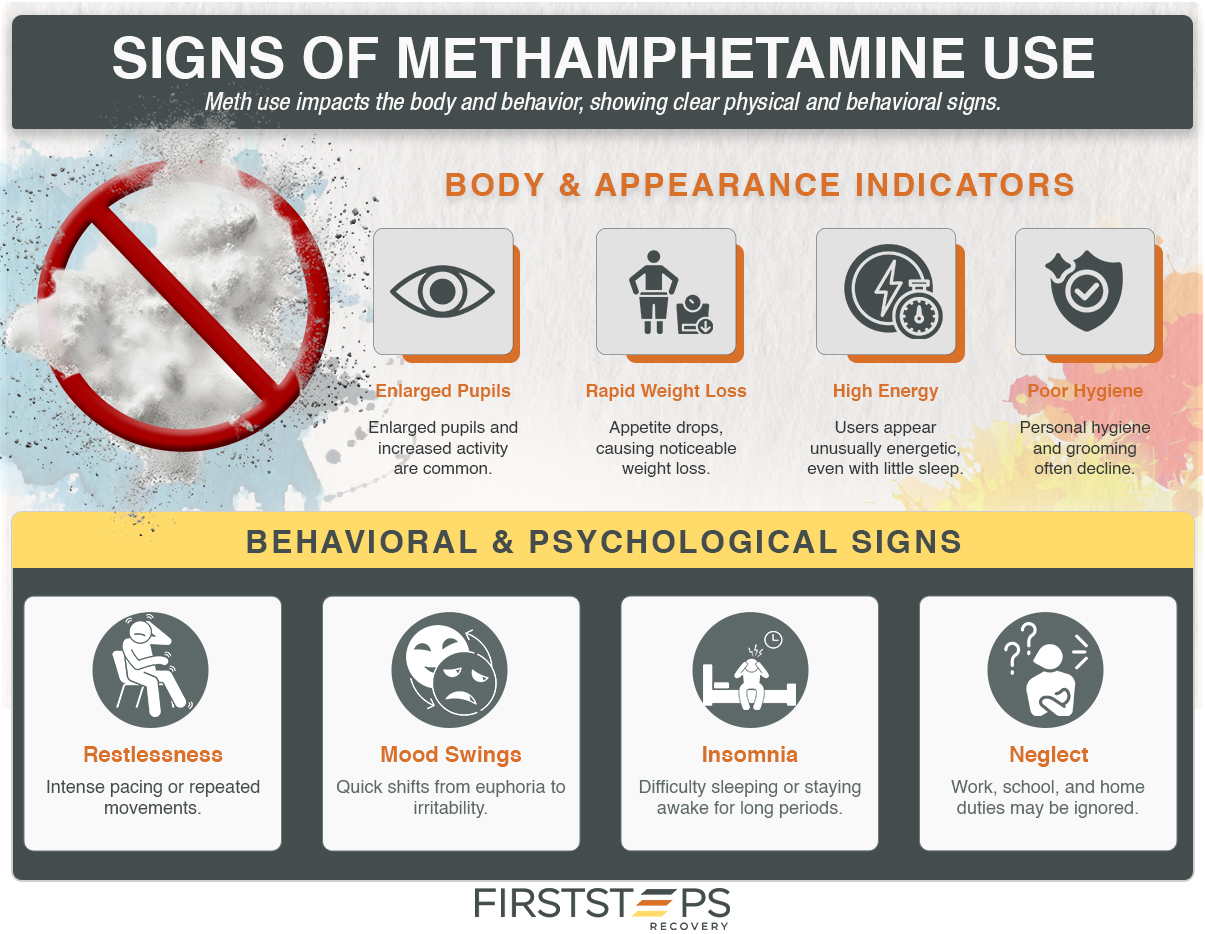Methamphetamine, commonly referred to as meth, poses a significant challenge due to its highly addictive nature and detrimental impact on individuals and communities. Despite its illegal status and well-documented risks, meth abuse continues to be a prevalent issue worldwide. Amidst the crisis, hope exists for methamphetamine addiction, meeting the unique needs of those affected.
First Steps Recovery provides meth addiction treatment program in California focused on the targeted needs of men and women, as well as outpatient treatment that serves all genders. These treatment centers in Fresno County, California employ a team of professionals that collaborate to offer tailored support for individuals struggling with methamphetamine addiction.

Meth, short for methamphetamine, is a highly addictive stimulant drug that affects the central nervous system. Meth takes the form of a white crystalline powder that is odorless and bitter to the taste and easily dissolves in liquid.
The discovery of meth itself took place in 1893, and was introduced to the United States from Japan during the 1930s. Non-addictive forms of meth are used for medical purposes, often in decongestants. Different forms of it are used for treatment of attention-deficit hyperactivity disorder (ADHD) and obesity in some cases. But methamphetamine that is used as a drug is frequently manufactured in illicit labs, frequently using medication that contains pseudoephedrine as a base for manufacturing meth.
If you believe you may be addicted to methamphetamine, getting help is important. Meth addiction treatment centers can provide personalized support and resources to help you overcome addiction and rebuild your life. Don’t hesitate to reach out for help today.

Symptoms of methamphetamine usage can differ, but typical signs include:
It is crucial for family members to recognize these signs and seek help to support their loved ones’ recovery process.
Meth addiction is a serious issue that impacts many individuals. Long-term methamphetamine use can result in:
Most people report that detoxing from methamphetamine use takes several weeks to a month. While this timeline is frequently observed during methamphetamine detoxification, it does not necessarily apply to every individual undergoing the process.
The detox process varies in length depending on various types of factors, including the length of time one spent using methamphetamine, the amount of the substance ingested, and the frequency with which the substance was used. Because there are so many factors that go into a meth addiction, it can be near impossible to say with 100% confidence how long detox will take.
Detoxification from methamphetamine usually involves several key components:
During meth detox at the First Recovery Center in Fresno County, CA, you can expect a mix of physical and emotional challenges as your body adjusts to being without the presence of the drug. Our meth addiction treatment program is a supportive environment, where compassionate staff and trained professionals can help you navigate through withdrawal and address any underlying issues.
The most common and distressing symptoms for those addicted to methamphetamines include abnormal sleep patterns, drowsiness, headaches, a lack of appetite, muscle spasms, and hallucinations. Emotional symptoms include depression, anxiety, paranoia, low energy, motivation, and cravings. Getting through these withdrawal symptoms is important for achieving sobriety. A medically supervised detoxification program can keep clients as comfortable as possible throughout this process.
During the early abstinence stage of detox, many withdrawal symptoms have either lessened or disappeared entirely. However, as the body experiences reduced stress, psychological withdrawal symptoms can take place. Cravings may become notably intense during this phase.
Individuals face a heightened risk of relapse during this critical stage of addiction treatment. Seeking assistance throughout the detoxification process can be essential in coping with physical symptoms of withdrawal, staying focused on the goal of sobriety, and avoiding the urge to relapse to feel better from withdrawal symptoms (and any symptoms of co-occurring disorders).
At this stage, individuals often report reduced cravings, and both physical and psychological withdrawal symptoms have mostly stopped. Individuals are usually able to focus on their treatment during this stage of recovery. They can learn how to utilize skills like relapse prevention, trigger identification and avoidance, and various coping skills. There’s also a greater ability to work on interpersonal relationships, which is crucial for maintaining sobriety and achieving a more fulfilling life after rehabilitation.

Meth addiction is typically treated through a combination of behavioral therapies, medication-assisted treatment (MAT), and support systems. It is crucial to address co-occurring disorders within treatment plans to ensure effective recovery by understanding both the addiction and how it may interact with existing mental health conditions, making comprehensive substance abuse and mental health treatment essential.
Therapies such as cognitive-behavioral therapy (CBT) and dialectical behavior therapy (DBT) are often utilized. CBT helps individuals identify and modify harmful thought patterns and behaviors that can be associated with meth use, while DBT helps with emotional regulation and tolerating distress. People undergoing meth addiction treatment often undergo different types of therapy as part of the comprehensive therapeutic process of recovery.
While there are no FDA-approved medications specifically for methamphetamine addiction, certain medications (such as antidepressants or medications used for other substance use disorders) may be prescribed to manage co-occurring conditions. Medication may also be given during detox to ease the effects of withdrawal symptoms, so that the person may better concentrate on meth addiction treatment.
Experiential therapies like yoga and art therapy are essential components of holistic rehabilitation. They help promote overall wellness and personal growth, to help boost recovery from addiction in all aspects of a person’s life. Successful recovery involves not just addressing the physical addiction, but also improving self-esteem, relationships, and overall well-being to lower the probability of relapse.
Depending on the severity of the addiction, individuals may undergo meth addiction treatment in either an inpatient or outpatient setting at a rehab center. Inpatient programs provide 24/7 medical supervision and intensive therapy, while outpatient programs offer flexibility for individuals to continue with their daily responsibilities while attending treatment.
Learning how to identify triggers and develop coping strategies to deal with stressful situations is crucial for maintaining sobriety. Relapse prevention planning helps individuals anticipate and navigate challenges they may encounter during their recovery journey. This is essential for achieving long term recovery, as it accounts for stress and temptation the person will encounter after they’ve completed treatment.

Making the decision to seek help for meth addiction is an incredibly brave and responsible act. It’s not “weak” to need help for addiction — it’s strong to realize that you have developed an addiction and need to focus on addressing it.
Though it may seem daunting to go through the meth withdrawal process, remember that treatment options are available that can help. The programs at First Steps Recovery in Fresno County, CA are designed to provide targeted support and recovery plans tailored to individual needs. Contact us now to learn more about how we can help you recover from meth addiction.

From our certified therapists and nurses to our emotional support animal "Cooper", our entire team is dedicated to the health and success of our clients throughout our program and beyond.
Have questions about how our treatment programs works? Let's talk.
Experience the benefits of our alcohol detox treatment at First Steps Recovery.
First Steps Recovery can help you find lasting sobriety from benzodiazepines.
Fentanyl is one of the most common causes of drug overdose in the United States today. Help end your addiction with First Steps Recovery.
When you're ready to end your methamphetamine addiction, we're here for you at First Steps Recovery.
Have questions about our substance abuse treatment programs? Let’s talk.
Learn why people choose to start their recovery at First Steps Recovery in Fresno County, CA.
Dayatra L.
Melissa B.
Bruce G.
Have questions about how our alumni program works? Let's talk.










Have questions about First Steps Recovery? We're here to help.
© Copyright 2023 • First Steps Recovery • All Rights Reserved